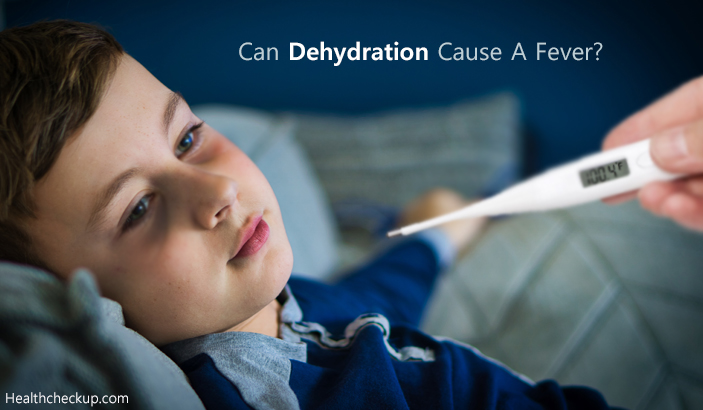Dehydration is a physiological condition caused by a deficit in the total body water you have. It occurs when your free water loss is greater than intake. Dehydration can cause a fever among other symptoms. Common causes of dehydration are vomiting, diarrhea, excessive sweating and various medical conditions such as diabetes.
Dehydration can be severe, moderate or mild. In most medical cases, dehydration is caused by an underlying medical condition. A medical professional may order a number of tests to determine the underlying cause of dehydration.
Can Dehydration Cause A Fever?
Dehydration causes a number of effects noted medically as symptoms of dehydration. This is due to your cells having inadequate water in them. Various organs may not be able to carry out their functions properly, thus leading to a dehydration fever. A dehydration fever is as a result of the accumulation of toxins in the bloodstream. With a reduced blood volume, your body has trouble eliminating toxins.
Effects and Symptoms of Dehydration
Dehydration makes you feel thirsty and has a headache. You also get distracted and maybe grumpy. You feel unfocused and anxious. As well you may also note that your concentration, vigilance, learning, memory and reaction time are affected due to dehydration.
A dry mouth or tongue is the first sign of dehydration. Once you suspect you are dehydrated, it is best to take some water. Mild dehydration is easily identified and treated within a home or office environment. Severe dehydration characterized by a change in urine color and a faster pulse needs medical attention.
Other effects of dehydration are changes in vision and changes in the color of your urine towards amber or brown. Dehydration headache fever is often seen in cases of severe dehydration in both adults and children. Dehydration and fever blisters may develop on the skin over the mouth or sun-burnt areas. This happens when dehydration is allowed to get severe.
How to Test for Dehydration
You should seek medical intervention for your dehydration if you feel lethargic or has had diarrhea for the last 24 hours. A weak or rapid pulse and dizziness should also be taken an alarm signal that you are severely dehydrated. When dehydration is due to diarrhea, vomiting or accompanied by a high fever, it is best to test for the underlying cause and treat it.
Tests that a doctor will order due to dehydration are a blood test and urinalysis. A blood test checks for abnormalities in the levels of electrolytes in your body. It is recommended to also have a red blood cell count and a hemoglobin levels analysis.
Urinalysis in testing for dehydration informs your doctor of the degree of dehydration. This is determined by the presence of ketones in your urine and specific gravity of the urine. Glucose levels in urine are also evaluated. Increased levels of glucose in urine point to diabetes as the cause of your dehydration.
Other tests that may be ordered by your doctor as a result of dehydration are blood pressure tests, blood chemistry test and an evaluation of your heart rate.
Home Treatment for Dehydration
Dehydration can be treated at home if it is mild. Home treatment for dehydration is by increasing your intake of fluids. Water is the best fluid to take as a treatment for dehydration. Sports drinks should be taken with caution. Their high levels of sugars may worsen diarrhea.
The best way to treat dehydration at home is by taking small amounts of fluid over short intervals. Forcing too much water into your system by drinking too much at once can cause vomiting. The small amounts of fluid will be absorbed quickly and bring the levels of fluid in your body back to normal.
Being in tune with your emotions is important for early identification of dehydratio. You will be able to note dehydration early stages and address it. If you notice you are quick to anger and struggling to concentrate on daily tasks, check that you are not dehydrated.
Dehydration and fever in toddlers is a threat to their health and wellbeing. Severe dehydration can lead to loss of life. Adults are able to weather mild dehydration without suffering adverse effects to their health. If you feel thirsty, you may already be dehydrated.
Avoid being outdoors in the sun for long periods to prevent dehydration that can cause a fever. You should also practice good personal and public hygiene to avoid diarrhea. Office workers should also be aware that they too can get dehydrated. Avoid being dehydrated by drinking adequate amounts of fluids at all times.
Medically Reviewed By

Professionally, a trained Microbiologist and Plant operator, Eustace is an experienced health content writer who is passionate about helping people lead a healthy life.









